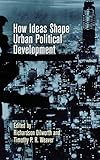How Ideas Shape Urban Political Development / ed. by Timothy P. R. Weaver, Richardson Dilworth.
Material type: TextSeries: The City in the Twenty-First CenturyPublisher: Philadelphia : University of Pennsylvania Press, [2020]Copyright date: ©2020Description: 1 online resource (328 p.)Content type:
TextSeries: The City in the Twenty-First CenturyPublisher: Philadelphia : University of Pennsylvania Press, [2020]Copyright date: ©2020Description: 1 online resource (328 p.)Content type: - 9780812252255
- 9780812297171
- HT361 .H76 2020
- online - DeGruyter
| Item type | Current library | Call number | URL | Status | Notes | Barcode | |
|---|---|---|---|---|---|---|---|
 eBook
eBook
|
Biblioteca "Angelicum" Pont. Univ. S.Tommaso d'Aquino Nuvola online | online - DeGruyter (Browse shelf(Opens below)) | Online access | Not for loan (Accesso limitato) | Accesso per gli utenti autorizzati / Access for authorized users | (dgr)9780812297171 |
Frontmatter -- Contents -- Preface: Urban Political Development and the Politics of Ideas -- 1. Ideas, Interests, Institutions, and Urban Political Development -- PART I. Ideas in American City Political Development -- 2. How Policy Paradigms Change: Lessons from Chicago’s Urban Renewal Program -- 3. The Idea of Blight in Baltimore -- 4. How Ideas Stopped an Expressway in Philadelphia -- 5. manufacturing Decline: The Conservative Construction of Urban Crisis in Detroit -- PART II. Ideas in national Urban Policy -- 6. The Neoliberal City and the Racial Idea -- 7. Contested Conceptions of Pluralism Between Cities and Congress over National Civil Rights Legislation -- 8. Ideas in US Education Policy: Reform, Localism, and Immigrant youths -- 9. Ideas, Institutions, Intercurrence, and the Community Reinvestment Act -- PART III. Ideas and Urban Political Development in Comparative Context -- 10. Immigrant Identities and Integration in the United States and Canada -- 11. “Trying out our Ideas”: Enterprise Zones in the United States and the United Kingdom -- PART IV. Ideas in Urban Political Development in the Global South -- 12. Ideas, Framing, and Interests in Urban Contention: The Case of Santiago, Chile -- 13. Ideas, Politics, and Urban Development in China -- 14. Politics of Dwelling: Divergent Ideas of Home in Kolkata -- 15. Policy mobility and Urban Fantasies: The Case of African Cities -- Notes -- List of Contributors -- Index -- Acknowledgments
restricted access online access with authorization star
http://purl.org/coar/access_right/c_16ec
A collection of international case studies that demonstrate the importance of ideas to urban political developmentIdeas, interests, and institutions are the "holy trinity" of the study of politics. Of the three, ideas are arguably the hardest with which to grapple and, despite a generally broad agreement concerning their fundamental importance, the most often neglected. Nowhere is this more evident than in the study of urban politics and urban political development.The essays in How Ideas Shape Urban Political Development argue that ideas have been the real drivers behind urban political development and offer as evidence national and international examples—some unique to specific cities, regions, and countries, and some of global impact. Within the United States, contributors examine the idea of "blight" and how it became a powerful metaphor in city planning; the identification of racially-defined spaces, especially black cities and city neighborhoods, as specific targets of neoliberal disciplinary practices; the paradox of members of Congress who were active supporters of civil rights legislation in the 1950s and 1960s but enjoyed the support of big-city political machines that were hardly liberal when it came to questions of race in their home districts; and the intersection of national education policy, local school politics, and the politics of immigration. Essays compare the ways in which national urban policies have taken different shapes in countries similar to the United States, namely, Canada and the United Kingdom. The volume also presents case studies of city-based political development in Chile, China, India, and Africa—areas of the world that have experienced a more recent form of urbanization that feature deep and intimate ties and similarities to urban political development in the Global North, but which have occurred on a broader scale.Contributors: Daniel Béland, Debjani Bhattacharyya, Robert Henry Cox, Richardson Dilworth, Jason Hackworth, Marcus Anthony Hunter, William Hurst, Sally Ford Lawton, Thomas Ogorzalek, Eleonora Pasotti, Joel Rast, Douglas S. Reed, Mara Sidney, Lester K. Spence, Vanessa Watson, Timothy P. R. Weaver, Amy Widestrom.
Mode of access: Internet via World Wide Web.
In English.
Description based on online resource; title from PDF title page (publisher's Web site, viewed 27. Jan 2023)


